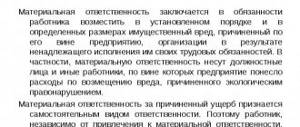When an employer and employee sign an employment contract, each assumes responsibility.
We talked about employer responsibility in one of our previous articles. In this article we will tell you about the employee.
An employer is not obliged to tolerate a bad employee. Therefore he can:
- due to tardiness and incompetence, dismiss as part of disciplinary liability;
- deducting from your salary for a broken computer is a financial liability;
— report the theft to the police, and they will prosecute you criminally and administratively;
- don't pay for hack work.
Now about everything in detail.
Administrative responsibility
Administrative liability is imposed for violation of labor legislation in accordance with the norms and rules of the Code of Administrative Offenses of the Russian Federation. Responsibility for neglect of labor legislation comes under Art. 5.27 Code of Administrative Offenses of the Russian Federation. The following are subject to administrative liability:
- employers themselves: both legal entities and individual entrepreneurs;
- officials who committed the violation.
Punishment comes in the form of:
- warnings;
- fine;
- disqualification.
Procedure for bringing to responsibility
The procedure for applying corrective measures to the perpetrator is quite simple and is implemented in a routine manner, regardless of the authority in which the proceedings take place.
First of all, the interested party must send an appeal, attaching all the necessary documentation that will substantiate the position of the initiator.
The submitted materials are studied in detail by an authorized official. After this, the specialist makes a decision. The response is sent to the interested party. In turn, the guilty person receives notification of what sanctions will be applied to him. The violator is also given time to fulfill his obligations, that is, to eliminate the identified deficiencies. The implementation of punishment depends on its type. For example, the violator pays a fine on his own, but in case of deprivation of the right to hold certain positions, this is assigned to the head of the organization.
If a person does not agree with the punishment, he can cancel it in accordance with the procedure established by law.
Types of liability for violation of labor laws
For citizens, officials and legal entities who have violated the requirements of legislation in the labor sphere or other legal regulations, including the norms of this branch of law, the following types of liability may be provided:
- disciplinary;
- material;
- civil law;
- administrative;
- criminal (Article 419 of the Labor Code of the Russian Federation).
At the same time, the procedure for imposing disciplinary sanctions and financial liability for violation of labor legislation is regulated by the Labor Code of the Russian Federation and other federal laws. Involvement in civil, administrative and criminal liability occurs using the norms of the relevant federal laws.
The establishment of one form of liability does not exclude the possibility of simultaneously attracting another type of liability.
Criminal liability of the employer
Expert opinion
Mikhailov Vladislav Ivanovich
Lawyer with 6 years of experience. Specializes in family law. Knows everything about the law.
The head of the organization or officials authorized by him may be held liable under the Criminal Code of the Russian Federation for violation of labor laws , including:
- For discrimination. The Labor Code of the Russian Federation prohibits discrimination in the labor sphere (Article 3 of the Labor Code of the Russian Federation). Violation of the principle of equality of rights and freedoms of a person, including when performing his work duties, is punishable in accordance with the provisions of Art. 136 of the Criminal Code of the Russian Federation.
Denial of employment or dismissal of a woman can be considered as a separate form of discrimination if the only motive for them was the presence of children under 3 years of age or pregnancy (Article 145 of the Criminal Code of the Russian Federation).
- Failure to pay wages or other amounts required by law. Criminal liability under Art. 145.1 of the Criminal Code of the Russian Federation entails violations in the form of partial or complete non-payment of wages or other amounts required by law, caused by the personal or selfish interest of the employer, the head of a legal entity or its separate structural unit.
- Failure to comply with occupational safety regulations. Responsibility for violation of labor legislation , regulated by Art. 143 of the Criminal Code of the Russian Federation, can be assigned to an official who, due to his job duties, must maintain compliance with labor safety standards and regulations. Crime under Art. 143 of the Criminal Code of the Russian Federation can only be committed through negligence.
If non-compliance with labor protection requirements does not lead to the results specified in Art. 143, then the responsible official may be subject to punishment in the form of an administrative penalty.
So, for failure to comply with the provisions of labor legislation, a person may be subject to disciplinary, material, civil, administrative or criminal liability.
At the same time, in cases specified by law, the so-called cumulation of liability is allowed, when a person can be simultaneously brought, for example, to disciplinary and administrative sanctions.
For violation of labor legislation, liability is provided for ordinary citizens or organizations. The forms of punishment that apply for non-compliance with labor standards and the conditions for their imposition differ depending on the severity of the offense.
Dear readers! To solve your specific problem, call the hotline or visit the website. It's free.
Violation of labor safety standards
Typical violations of labor protection standards:
- allowing employees to work without special courses and knowledge testing on labor protection;
- absence of a medical report on compliance of the health status with the specialty;
- working with faulty technical equipment or operating equipment without observing safety precautions;
- work activities without the use of special personal protective equipment by employees;
- engaging individual citizens in overtime, harmful or difficult work, which is prohibited for them by law.
Types of liability for violation of labor laws and legal regulation
Citizens - officials and legal entities - who have violated legal requirements in the field of labor or other regulations may be brought to one of the following types of liability:
- Disciplinary.
- Material.
- Administrative.
- Civil.
- Criminal.
The procedure for imposing disciplinary sanctions and bringing to financial liability for violation of labor legislation is regulated by the Labor Code and other federal and local regulations. Bringing to other types of liability is regulated by the Civil Code, Criminal Code and Code of Administrative Offenses.
Bringing an employer to one of these types of liability does not exclude the possibility of establishing another form of liability for him.
Disciplinary responsibility
Expert opinion
Mikhailov Vladislav Ivanovich
Lawyer with 6 years of experience. Specializes in family law. Knows everything about the law.
Usually, when we are talking about bringing disciplinary liability, we are talking about penalties against an employee related to failure to perform or improper performance of official duties assigned to him.
The employer is obliged to consider the application received from the trade union regarding violation of labor legislation and other regulations that contain labor law norms, the terms of a collective agreement or agreement, and then submit its decision on it to the representative body.
If a violation is confirmed, the employer is obliged to take disciplinary action against the manager. Disciplinary punishment may be one of the following measures : reprimand, reprimand and dismissal. The latter measure is used in exceptional situations when serious offenses are committed.
According to the provisions of the Labor Code, for one offense a person can be subject to only one form of punishment. It is determined taking into account the severity of the offense and the circumstances of the incident.
Administrative responsibility
Most often, the employer is brought to administrative liability for violating labor laws. Such violations are identified during control and supervisory activities by government agencies (labor inspectorate).
Also, the employer can be held administratively liable if the applicant goes to court with a statement of claim to declare the refusal to conclude an employment contract illegal on the basis of Part 6 of Art.
64 and part 3 of Art.
391 TK. In this case, both the guilty official and the organization as a whole are held accountable.
An employer may be held administratively liable for violating labor legislation according to the norms of the Code of Administrative Offences. According to the provisions of Art. 5.27 of the Administrative Code, this article provides for penalties, the amount of which differs depending on the category of the offender.
Based on paragraph 1 of Art. 5.27 of the Code of Administrative Offences, fines for the employer are set in the following amounts:
As an official, you can fine the head of the company, the head of the human resources department, or the chief accountant. For example, an accountant can be fined for incorrect calculation of salaries, and the head of the human resources department can be fined for inappropriate maintenance of personnel documentation.
It is worth noting that in case of minor primary violations of labor legislation, inspectors can issue a warning to the employer, and then, if the employer does not correct the shortcomings, impose a fine.
For repeated violation of labor legislation, the employer is liable under Part 2 of Art. 5.27 of the Code of Administrative Offenses in an increased amount:
It is worth considering that when bringing an employer to punishment under Part 2 of Art.
5.27 of the Code of Administrative Offences, an offense should be understood as the commission of exactly the same violation of labor legislation, and not a simple failure to comply with labor standards. Such explanations were given in paragraph.
17 Resolution of the Plenum of the Supreme Council No. 5 of 2005. For example, the employer first did not pay the full payment when dismissing one employee, then another.
Examples of violation of labor legislation, which entails administrative liability, may include:
- Concluding a fixed-term employment contract with an employee without proper grounds.
- Delay in payment of wages , final payment, and other payments provided for by local regulations of the enterprise.
- Imposing a disciplinary sanction on an employee who refused to perform work not provided for by his job duties . According to Art. 60 of the Labor Code, the employer may require the employee to perform only those duties that are provided for in the employment contract or job description.
A violation of labor legislation is failure to comply (improper fulfillment) of the requirements of regulatory authorities.
Based on Art. 353 of the Labor Code, state supervision over compliance with labor legislation is carried out by the federal labor inspectorate.
She exercises her powers in accordance with Regulation No. 875 of 2012. According to clause
15 of this provision, labor inspectors take measures to identify, prevent and suppress offenses in the field of labor legislation, as well as to hold the employer accountable.
When detecting violations, the labor inspectorate may:
- send the employer an order to immediately eliminate the identified violations , indicating specific deadlines for their elimination;
- take measures to monitor whether the employer has eliminated violations.
A number of articles of the Code of Administrative Offenses are devoted to the employer’s liability for violation of labor legislation in relation to collective agreements in force at the enterprise:
Officials bear disciplinary responsibility in addition to administrative responsibility.
Material liability
Based on Art. 232 of the Labor Code, any party to an employment contract that has caused damage to the other party is obliged to compensate it in accordance with the regulations of the Labor Code or other federal laws, as well as local regulations.
The financial responsibility of the manager can arise to the organization or to the employee.
The employer's financial liability to the employee may arise in the following situations:
- for depriving an employee of the opportunity to perform labor functions under Art. 234 of the Labor Code (for example, in case of untimely issuance of a work book or illegal dismissal, failure to comply with an order from the labor inspectorate to restore the employee to his previous position, in case of illegal removal from work, transfer to a low-paid position, incorrect entry of information about dismissal into the work book);
- for damage caused to the employee’s property under Art. 235 TK;
- for delay in payment of wages and other due payments under Art. 236 TK;
- for moral damage caused to an employee under Art. 237 TK.
Civil liability
According to the Civil Code, the head of an organization, in cases provided for by federal laws, is obliged to compensate the organization for losses.
The amount of damages is determined based on the provisions of civil law:
- losses are compensated in full , unless otherwise provided by current legislation;
- Losses are understood as actual actual expenses of the person whose rights were violated, as well as lost profits (lost income) and real damage.
The organization and the entrepreneur are obliged to compensate for the damage caused by its employees in the performance of labor or official duties under paragraph 1 of Art. 1068 Civil Code. But in the future, the employer may demand that this employee compensate for expenses by way of recourse under clause 1 of Art. 1081 Civil Code.
When the employer violated the employment contract
Violations of the employment contract and violations in the field of labor relations are generally monitored by Rostrud. There is a document of this federal service called “List of typical violations of mandatory requirements...”, which collects and classifies by degree of risk for employees all violations of the employment contract by the employer. There are 76 violations in total.
The most serious violations: Rostrud warns
The most serious violations are marked with points from 7 to 10. There is a link to the articles of the Labor Code of the Russian Federation for each violation.
When applying for a job it is:
- Failure to draw up an employment contract (Article 16, 19.1).
- A civil contract is concluded instead of an employment contract, but in fact an employment relationship takes place (Article 15).
- The employee is allowed to work, but is not authorized to do so by the employer (Article 67.1).
In the case of dismissal, these are violations of the dismissal procedure during liquidation (termination of the activities of an individual entrepreneur), reduction in number or staff (Article 81).
Working time violations:
- Violation of work procedures on weekends, holidays, overtime, at night, in relation to car drivers, pilots, minors (Article 96, 268).
- Failure to provide rest between shifts (Article 103).
- Increasing the duration of working hours in total for a period or per week (Article 91 and a number of others).
Rest time violations:
- The employee is not granted additional leave (Article 116).
- The employee is deprived of days off (Article 110).
- The employee, in appropriate cases, is deprived of breaks for heating and rest (Article 109).
Wage violations:
- Failure to pay the salary established by the employment contract, or the salary established by the contract is not paid in full (Article 136-6).
- The salary is below the minimum wage (Article 133-3).
- Weekends and working holidays are paid as ordinary days (Article 153).
- Overtime is paid like regular days (Article 152).
In the field of guarantees and compensation, the most serious is the deprivation of severance pay to an employee in accordance with Art. 178.
Occupational Safety and Health:
- The employee is allowed to work, but has not completed occupational safety training; is not provided with personal protective equipment when working in conditions of high danger to life and health (Articles 212, 225, 221).
- The employee was admitted to work, but did not undergo the required medical examination or was admitted having medical contraindications to this work (Article 69 and a number of others, depending on the type of medical examination, Article 212).
- Labor safety requirements are violated at production (Articles 212, 211).
- Ignoring the requirements for organizing workplaces for people with disabilities (Article 224)
- Inappropriate organization of labor for minors, ignoring restrictions and prohibitions on the use of their labor (Article 265).
- Inappropriate organization of work for women and workers with family responsibilities, ignoring restrictions on the use of their labor (Article 253 and a number of others).
Violation of the provisions of the collective agreement (Article 55) is classified as serious (7 points). It is also considered a serious violation (8 points) to ignore the requirements of Federal Law No. 426 dated 12/28/13 regarding potentially harmful, hazardous production factors in the workplace.
Other violations
Other violations of the employment contract and working conditions of personnel may also have consequences for the administration. Rostrud draws the employer's attention to such factors of medium (4-6 points) and low (3-1 points) risk as:
- violation of the procedure for drawing up an employment contract and work books;
- violation of the dismissal procedure (termination of an employment contract);
- violation of the procedure for recording working hours;
- violation of the vacation schedule;
- violation of deadlines for payment of wages, or if these deadlines are not documented;
- non-payment of the average wage when an employee undergoes a medical examination, etc.
The full list of violations and their “weight” is contained in the above “List of Typical Violations.”









